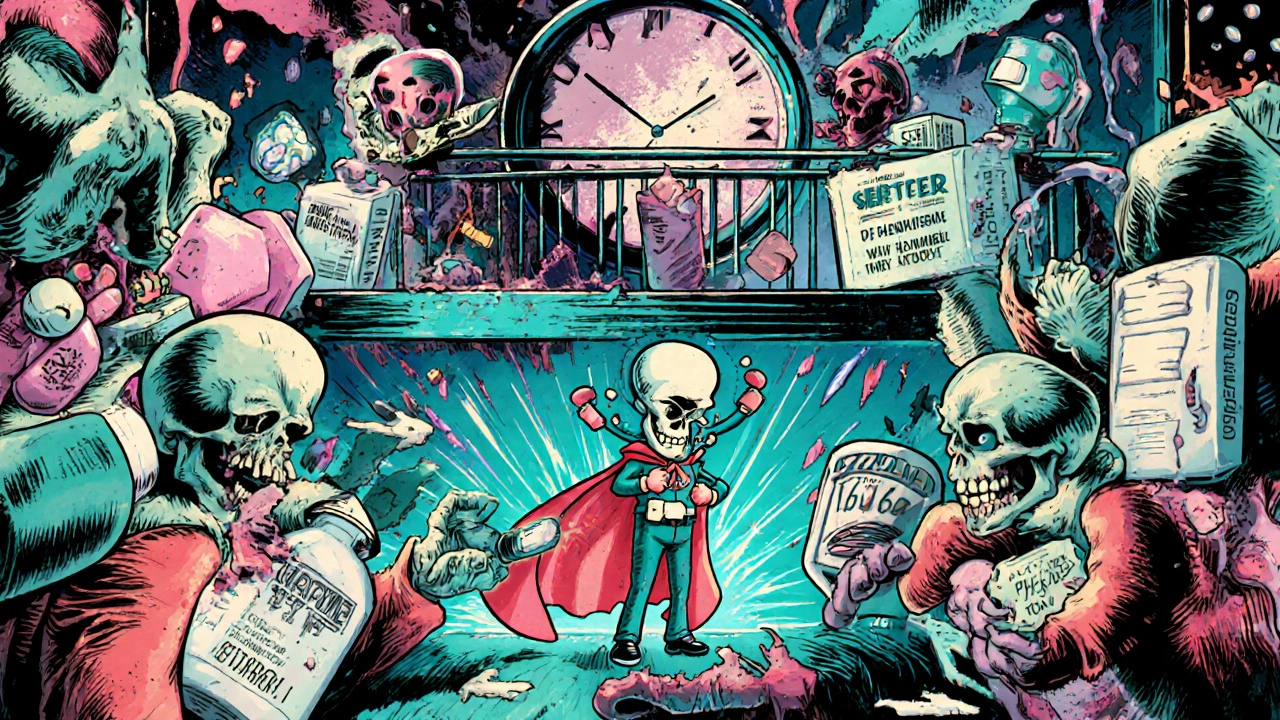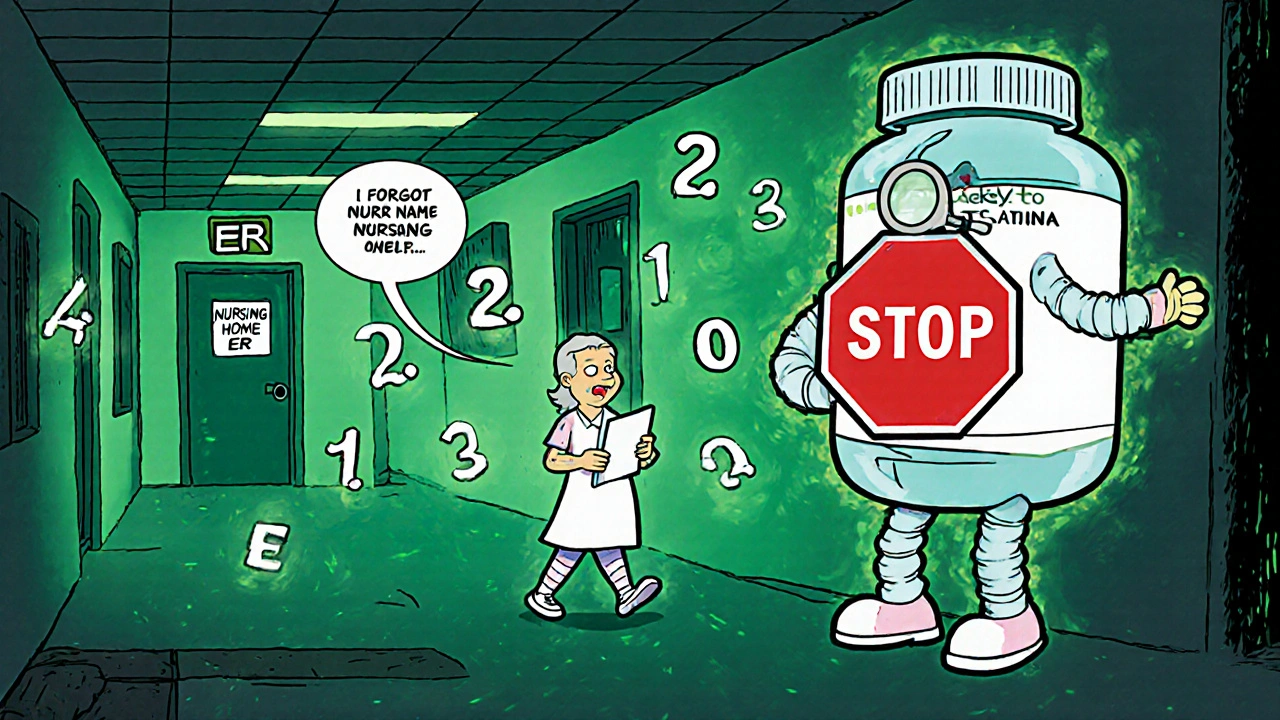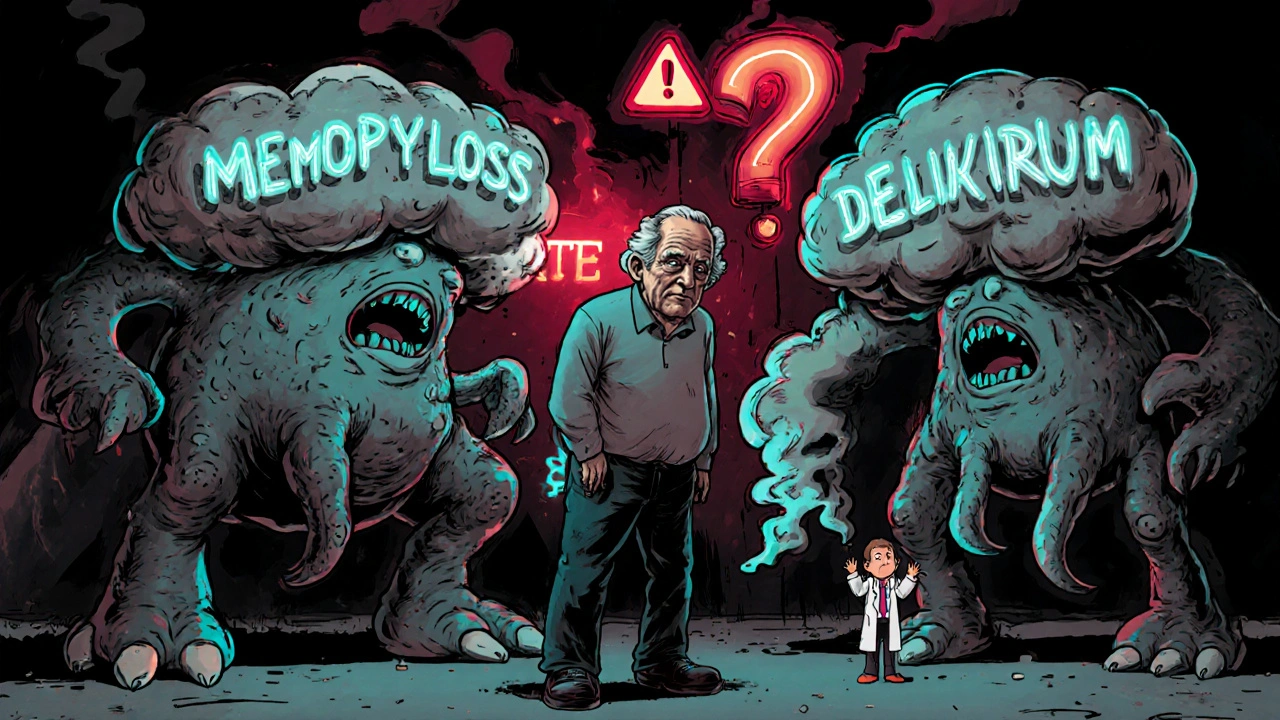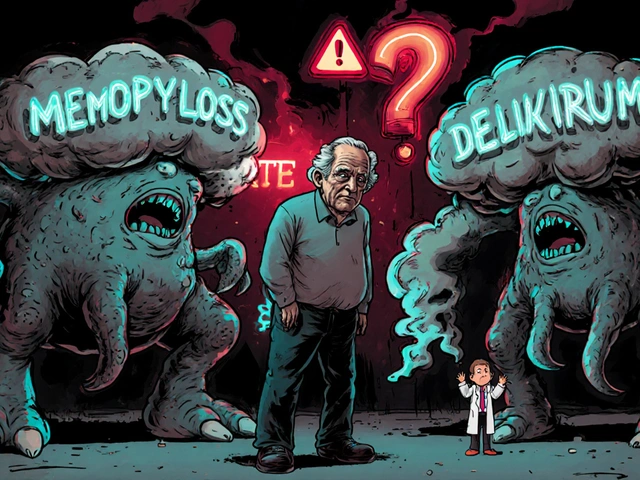Anticholinergic Burden Calculator
Calculate your cumulative anticholinergic burden score to understand your risk of cognitive decline from medication combinations. The Anticholinergic Cognitive Burden (ACB) scale rates medications from 0 (minimal) to 3 (high risk).
Your Medications
Selected Medications
Risk Assessment
Select your medications to see your risk level.
Combining tricyclic antidepressants and first-generation antihistamines might seem harmless-especially if you're taking one for depression and another for allergies or sleep. But what looks like a simple fix can quietly push your body into a dangerous state called anticholinergic overload. This isn’t theoretical. It’s happening in clinics, emergency rooms, and nursing homes right now, often because no one connected the dots between the two meds.
What Is Anticholinergic Overload?
Your body uses acetylcholine, a key neurotransmitter, to control everything from memory and attention to heart rate, digestion, and bladder function. Anticholinergic drugs block this chemical. One drug might cause mild dry mouth or drowsiness. Two? Three? Add them up, and your brain and body start to drown in the lack of acetylcholine.This isn’t just about feeling a little fuzzy. Anticholinergic overload can cause confusion, hallucinations, urinary retention, fast heartbeat, constipation, and even delirium. In older adults, it’s one of the top reasons for sudden cognitive decline that gets mistaken for dementia.
Why TCAs and Antihistamines Are a Dangerous Pair
Tricyclic antidepressants (TCAs) like amitriptyline, imipramine, and clomipramine were among the first antidepressants developed. They work by boosting serotonin and norepinephrine-but they also strongly block muscarinic receptors, the same ones targeted by anticholinergic drugs. Amitriptyline, for example, has a Ki value of 8.9 nM at the M1 receptor, meaning it binds tightly and stays active for a long time.First-generation antihistamines like diphenhydramine (Benadryl), hydroxyzine, and chlorpheniramine were designed to block histamine to reduce allergy symptoms. But they don’t stop there. They also block acetylcholine receptors with similar strength. Diphenhydramine’s Ki value is around 1,000 nM-higher than amitriptyline’s, but people take it in doses of 25-50 mg, multiple times a day. That adds up fast.
Together, they create a cumulative effect. The Anticholinergic Cognitive Burden (ACB) scale rates amitriptyline as a 3 (highest risk) and diphenhydramine as a 2. A score of 5 means you’re at double the risk of developing dementia over time, according to a 2015 JAMA Internal Medicine study. And it doesn’t take years-just weeks of daily use can trigger acute delirium in seniors.
Who’s Most at Risk?
People over 65 are the most vulnerable. Their livers and kidneys don’t clear drugs as quickly. Their brains are more sensitive to acetylcholine loss. And they’re more likely to be on multiple meds for chronic conditions.But it’s not just the elderly. Anyone taking TCAs for nerve pain, depression, or migraines who also reaches for Benadryl for allergies or sleep is at risk. A 2021 survey by the American Geriatrics Society found that 37% of pharmacists see at least one case of anticholinergic overload every month. Nearly a third of those cases involve a TCA and a first-gen antihistamine.
One patient on a Psych Forums thread described being rushed to the ER after adding Benadryl to her daily amitriptyline. She had urinary retention, slurred speech, and couldn’t remember her own name. Her doctor hadn’t warned her about the interaction.

It’s Not Just Benadryl
Many people think Benadryl is the only culprit. But other common OTC sleep aids and allergy meds carry the same risk: doxylamine (Unisom), promethazine (Phenergan), and even some cough syrups with diphenhydramine or carbinoxamine.Even prescription antihistamines like hydroxyzine (Atarax), often used for anxiety or itching, are just as dangerous when paired with TCAs. And it’s not just antihistamines. Some antipsychotics, bladder meds like oxybutynin, and even certain Parkinson’s drugs add to the burden. One Elsevier study found that 52% of high-risk alerts involved combinations of two or more antidepressants-with fluoxetine and amitriptyline being the most common problematic duo.
What About Newer Antidepressants?
Selective serotonin reuptake inhibitors (SSRIs) like sertraline and escitalopram have far less anticholinergic activity. Only 5-10% of patients on SSRIs report anticholinergic side effects, compared to 30-50% on TCAs. That’s why many doctors now avoid TCAs unless absolutely necessary.But TCAs still have a place. For neuropathic pain, fibromyalgia, and some types of chronic headaches, they’re more effective than SSRIs. The problem isn’t the TCA itself-it’s stacking it with other anticholinergics.
Even among TCAs, there’s variation. Nortriptyline and desipramine have lower anticholinergic effects than amitriptyline or clomipramine. If you’re on a TCA and need an antihistamine, ask if switching to a lower-risk TCA is an option.
What Are the Alternatives?
If you need an antihistamine for allergies or sleep, skip the first-generation ones entirely. Second-generation antihistamines like loratadine (Claritin), cetirizine (Zyrtec), and fexofenadine (Allegra) have almost no anticholinergic activity. They’re rated as 0 on the ACB scale.For sleep, melatonin (0.5-5 mg) is a safer bet than diphenhydramine. It doesn’t block acetylcholine. It doesn’t cause next-day grogginess. And it doesn’t increase dementia risk.
For allergies, nasal corticosteroids like fluticasone (Flonase) or azelastine (Astelin) are more effective long-term than oral antihistamines-and they don’t touch your brain’s acetylcholine system.

How to Protect Yourself
1. Know your meds. Check every pill you take-even OTC ones-for anticholinergic activity. Use the ACB scale as a guide: 3 = high, 2 = moderate, 1 = low, 0 = minimal. 2. Ask your doctor or pharmacist. Say: “I’m on amitriptyline. Is this antihistamine safe to take with it?” Don’t assume they know. 3. Watch for symptoms. If you feel unusually confused, have trouble urinating, feel your heart racing, or notice memory lapses, stop the new med and call your provider immediately. 4. Ask about deprescribing. If you’ve been on a TCA and Benadryl for months, ask if you can taper off the antihistamine. Studies show that removing anticholinergics improves cognition in 34% of elderly patients within 18 months.What’s Changing in Medicine?
The tide is turning. In 2023, the FDA required all TCA and first-gen antihistamine labels to include warnings about cumulative anticholinergic effects. The American Geriatrics Society’s Beers Criteria now explicitly says: “Avoid first-gen antihistamines in older adults taking TCAs.”Electronic health records like Epic now block these combinations automatically. If a doctor tries to prescribe diphenhydramine to someone on amitriptyline, the system pops up a hard stop. A 2022 JAMIA study found that 92% of such attempts trigger an alert.
More psychiatrists are using the ACB scale routinely. In 2018, only 32% did. By 2023, that number jumped to 78%. The National Institute on Aging is funding a $2.4 million study to track long-term cognitive damage from these combinations. Early data shows that even 30 days of exposure can double delirium risk in people over 65.
And in some hospitals, pharmacists now run automated “anticholinergic burden audits” on all elderly patients. One program reduced inappropriate TCA-antihistamine prescriptions by 41% in just six months.
Final Thought: Just Because It’s Available Doesn’t Mean It’s Safe
Benadryl is cheap. It’s everywhere. It’s sold next to candy bars. But it’s not harmless. When paired with a TCA, it’s a slow-burning fuse.TCAs are powerful tools. But they’re not gentle. And antihistamines aren’t just allergy pills-they’re brain-altering drugs. The real danger isn’t in taking one. It’s in taking both without realizing how they work together.
If you’re on a TCA, don’t reach for Benadryl out of habit. Talk to your doctor. Switch to a safer option. Your brain will thank you.
Can I take Benadryl with amitriptyline?
No, combining Benadryl (diphenhydramine) with amitriptyline significantly increases your risk of anticholinergic overload. Both drugs block acetylcholine, and together they can cause confusion, urinary retention, fast heart rate, and delirium-especially in older adults. Even if you’ve taken them together before without issues, the risk builds over time and can lead to permanent cognitive damage. Switch to a non-anticholinergic alternative like loratadine or melatonin.
What are the signs of anticholinergic overload?
Symptoms include severe dry mouth, blurred vision, constipation, difficulty urinating, rapid heartbeat, confusion, memory loss, hallucinations, slurred speech, and extreme drowsiness. In older adults, sudden confusion that looks like dementia is often the first clue. If you’re on a TCA and notice any of these after starting a new antihistamine, stop the antihistamine and contact your doctor immediately.
Are all antihistamines dangerous with TCAs?
No. Only first-generation antihistamines like diphenhydramine, hydroxyzine, and chlorpheniramine have strong anticholinergic effects. Second-generation antihistamines-loratadine (Claritin), cetirizine (Zyrtec), and fexofenadine (Allegra)-have minimal to no effect on acetylcholine receptors and are safe to use with TCAs. Always check the active ingredient, not just the brand name.
Why are TCAs still prescribed if they’re so risky?
TCAs are still used because they work well for certain conditions-especially nerve pain, fibromyalgia, and some types of chronic headaches-where newer antidepressants often fail. Their dual action on serotonin and norepinephrine makes them uniquely effective for pain. But they’re no longer first-line for depression. Doctors now only prescribe them when safer options haven’t worked, and they’re careful to avoid combining them with other anticholinergics.
Can anticholinergic overload cause dementia?
Long-term use of multiple anticholinergic drugs, including TCAs and first-gen antihistamines, is linked to a higher risk of dementia. A 2015 JAMA Internal Medicine study found that people with the highest cumulative anticholinergic exposure had a 54% increased risk of dementia over 10 years. The risk isn’t from one pill-it’s from months or years of buildup. Stopping these drugs can slow or even reverse cognitive decline in some cases.
What should I do if I’m on both a TCA and Benadryl?
Don’t stop either medication abruptly. Contact your doctor or pharmacist. Ask for a medication review using the Anticholinergic Cognitive Burden (ACB) scale. They can help you switch to a safer sleep aid like melatonin or a non-anticholinergic allergy med like loratadine. If you’re using Benadryl for sleep, try improving sleep hygiene first-cool room, no screens before bed, consistent schedule. Many people find they don’t need the med at all after making small changes.


I used to take amitriptyline for nerve pain and Benadryl for sleep like it was nothing. Thought I was just being practical. Then one night I couldn’t remember my kid’s name. Just… blank. Like my brain hit pause. Took me weeks to get back to normal after quitting the diphenhydramine. Don’t let this be you. It’s not a joke. Your brain doesn’t warn you before it starts glitching.
So now we’re treating adults like toddlers? Next they’ll ban coffee because it’s a stimulant. If you can’t handle two pills, maybe you shouldn’t be taking pills at all. This is why America’s falling apart - everyone’s scared of their own shadow.
Wow what a shocker. People take meds and then get weird. Who knew? I mean really. Did you need a 2000 word essay to tell us that mixing drugs can be bad? My grandma took three antihistamines and a TCA and lived to 92. So maybe stop fearmongering and start living
ACB scale? Really? That’s your solution? A spreadsheet of risk scores. How quaint. The real issue is that medicine has become a checklist industry - not a science. You don’t need a number to know that blocking acetylcholine in a 70-year-old is dumb.
They say ‘just ask your doctor’ - but doctors are overworked, underpaid, and trained to prescribe, not to think. They don’t see you as a person. They see you as a code. A CPT code. A refill request. A checkbox. And when you end up in the ER with delirium, they’ll shrug and say, ‘Well, you didn’t tell me you were taking Benadryl.’ But you didn’t know to tell them because NO ONE TOLD YOU. And that’s the tragedy.
Let me tell you something. I’ve been on amitriptyline for 12 years. I’ve taken diphenhydramine every night for 8. I’m 68. I’m sharp as a tack. I play chess online every day. I remember every move. I remember my wife’s birthday. I remember the name of my first dog. So don’t you dare come here and tell me that this is some kind of ticking time bomb. You’re not me. You don’t know my body. You don’t know my genetics. You don’t know my history. And you’re not qualified to scare people into giving up what works for them just because some study says so. This is medical tyranny dressed up as concern.
Look, I get why this post exists. I really do. But I also get why people still use Benadryl - it’s cheap, it’s easy, and it works. The problem isn’t the people taking it. It’s the system that lets them take it without warning. Pharmacies should have a pop-up when you buy diphenhydramine if you’ve bought a TCA in the last 6 months. Not a ‘warning’ on the bottle - a real alert. Like, ‘Hey, this combo might make you forget your own face.’ That’d stick.
Hey everyone - if you’re on a TCA and you’re using Benadryl for sleep, I’ve got good news: you can switch to melatonin. Start with 1mg, go up to 3mg if needed. No grogginess, no brain fog. And for allergies? Zyrtec or Claritin. They’re like 5 bucks a month at Walmart. Seriously, your brain will thank you. I’ve helped 3 people make this switch in the last month - all of them said they felt like they got their memory back. You don’t need to suffer. Just ask your pharmacist. They’re usually awesome about this stuff.
Man, I used to think ‘anticholinergic’ was just a fancy word for ‘makes you sleepy.’ Then my mom got hospitalized after mixing amitriptyline and Unisom. She thought it was just ‘a little help.’ She didn’t know it was a silent storm. She’s okay now, but she still forgets where she put her keys. I wish someone had told us before it happened. This post? It’s the kind of thing you save and send to your family. Not because it’s scary - because it’s necessary.
Why are we blaming the drugs and not the people? If you’re old and you take too many pills then you deserve what you get. This is not a crisis. This is responsibility. If you can’t manage your meds then maybe you shouldn’t be living alone. The world doesn’t owe you a safety net made of pharmaceutical warnings
I’m 42. I take nortriptyline for migraines. I used to take Benadryl for allergies. I didn’t realize I was getting foggy until I started forgetting where I parked my car. Then I switched to Allegra. Three days later, I felt like I’d slept for a week. No more brain fog. No more dry mouth. Just… clarity. It’s not about fear. It’s about awareness. And awareness saves lives.
THEY’RE DOING THIS ON PURPOSE. THE PHARMA COMPANIES KNOW THAT SECOND-GEN ANTIHISTAMINES DON’T MAKE AS MUCH MONEY. THEY PUSHED BENADRYL FOR DECADES. NOW THEY’RE SCARING YOU TO MAKE YOU BUY THEIR NEWER DRUGS. THE FDA IS IN THEIR POCKET. THE ‘ACB SCALE’? A MARKETING TOOL. DON’T FALL FOR IT. YOUR BODY KNOWS WHAT IT NEEDS.